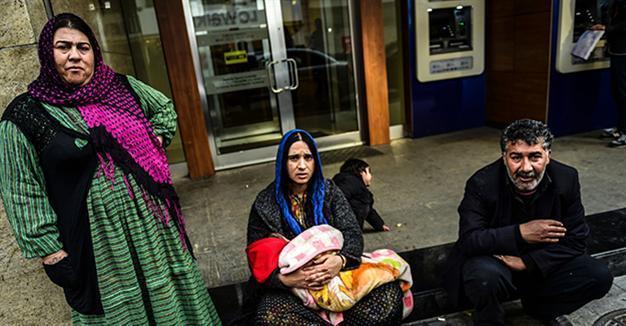Only 3 pct of Syrian refugees in Turkey ‘qualified’ labor: Ministry
Bülent Sarıoğlu - ANKARA

Syrian refugees wait on the Istiklal avenue in Istanbul on February 1, 2016. AFP Photo
No more than 3 percent of the more than 2.4 million Syrian refugees in Turkey are part of the “educated-qualified” labor force, according to a new report from the Labor and Social Security Ministry.
“A majority of Syrian refugees in Turkey are between the ages of 18 and 65. At the first glance, this is good for Turkey, as around 52 percent of the Syrian refugees here are of working age,” said the ministry’s general director of labor, Nurcan Önder, discussing new regulations for work permits in Turkey.
“But we are talking about people who have fled from a war. Most of them do not have an identity card. When we have a look at their professions, we see that 80 percent of these people’s professions are unknown. We have therefore accepted them ‘unqualified.’ Only 3 percent of Syrian refugees in Turkey are part of the ‘qualified’ labor force,” Önder added.
However, she also noted that only the southeastern province of Şanlıurfa has suffered from a dramatic decline in employment figures out of all Turkish provinces hosting large numbers of Syrian refugees.
Qualified but restricted
“Some of our Syrian guests are of higher education and wealth. Some 8,000 of them have applied for work permits and we granted work permits to 7,300 of them. These are highly qualified workers, almost half of whom are entrepreneurs,” she said.
Refugees in Turkey are not allowed to work or to be employed in the country without a valid work permit, according to a government decree published in the Official Gazette last month.
Önder noted that the prospective work permits will not change applicants’ “temporary protection status.”
“Refugees will be able to apply to work in provinces identified by the Interior Ministry. We estimate that most of them will meet the demand for workers in seasonal agriculture and the animal breeding sector,” she said, adding that the unregistered structure of the job market is a big obstacle.
“Unregistered employment puts Turkish nationals in a disadvantageous position, as well as others. Some companies prefer to hire anyone who will cost the employer just 500 Turkish Liras, rather than employing a Turkish worker who will cost them up to 2,000 liras in the minimum wage,” Önder stated.
She also noted that at present even qualified foreigners cannot apply to work in Turkey in professions such as dentistry or the law, so a change had to be passed in order to accommodate qualified Syrians in these areas.
“Even if foreign citizens have a diploma, they cannot work as a dentist. Physicians can work as long as the required accreditation process is completed … The Health Ministry and the Education Ministry have established an accreditation system that will serve only Syrians,” Önder said.
Meanwhile, in addition to the refugees currently in Turkey, there are also around 80,000 Syrians who took out a residence permit by entering Turkey at the beginning of the Syrian war, according to Önder.
